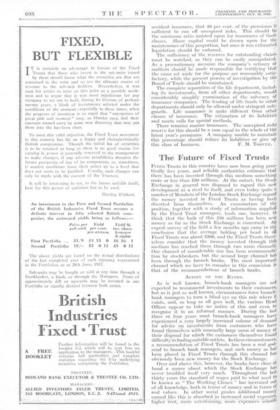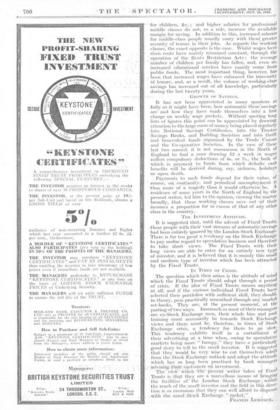The Future of Fixed Trusts
FIXED Trusts in this country have now been going praq• tically five years, and reliable authorities estimate that there has been invested through this medium something more or less than £80 millions. At the outset, the Stock Exchange in general was disposed to regard this new development as a rival to. itself, and even today :quite. a number of Members of the London Stock Exchange regard the money invested in Fixed Trusts as having been diverted from themselves. An examination lof th position, together with. a study of information supplic i by the Fixed Trust managers, leads one, however, t think that the bulk of this £30 millions has belen neiF, money as far as the Stock Exchange is concerned. AO expert survey of the field. a few months ago ea* to th conclusion that the average holding per head in Fixed Trusts was about £300, and the Fixed Trusts then1 selves consider that the money invested through tlif,R Medium has reached them through two main channelS: One channel of considerable size has been recommendar tion by stockbrokers, but the second large channel has been through the branch banks. The most important channel which we have to consider in this connexion is that of the recommendations' of branch banks. 1
E
ACTION OF THE BANKS. .
As is well known, branch-bank managers are not expected' to recommendinvestments to their customers, but as is just as well known, circumstances force branch- bank managers to turn a blind eye on this rule where it exists, and, so long as all goes well, the various Head Offices appear to take no notice of this and even to recognise it in an informal manner. During the laii three oi, four years most branch-bank managers have experienced a yery largely increased volume of demand for 'advice on investments from customers who have found 'themselves with'unusually large sums of money at their disposal for which the customers themselves found difficulty in finding suitable outlets. In these circumstances, a recommendation of Fixed Trusts has been a real god' send to branch bank managers, arid such money as has been placed in Fixed Trusts' through this channel 10 obviously been new money for the Stock Exchange. Over and above this, however, the banks have close at hand a source about which the Stock Exchange has never troubled itself very much. Throughout the last thirty years the standard of wages paid to what used to be known as " The Working Classes " has increased out of all knowledge, both in terms of money and in terms of real values. In other social grades additional /honor, earned like this is absorbed in increased social expens0, Higher -rent; - niOre" entertaining,- more 654ieriSive -selioolg - for children, &c. and higher salaries -for ' professional middle classes do not, as a rule, increase the available margin for saving. In addition to this, increased salaries for middle-class people usually carry with theml greater security of tenure in their jobs. As regards the working classes, the exact opposite is the case. Whilst wages have risen rents have mainly remained constant, through the operation of the Rents Restriction Acts ; the ;average number of children per family has fallen, and, even so, increased educational services have mainly come from public funds. The most important thing, howeirer, has been that increased wages have enhanced the in :security of tenure, and, as a result, the volume of workgrig-class 'savings has increased out of all knowledge, particularly during the last twenty years.
GROWTH OF SAVINGS.
It has not been appreciated in many quarters as fully as it might have been, how automatic these!savings are and how they have made themselves into a first charge on weekly wage packets. Without quoting long lists of figures this point can be appreciated by drawing attention to the large sums of money being placed rggularly into National Savings Certificates, into the ;Trustee Savings Banks, and Building Societies and into thrift and 'benevolent funds organised by the Trade F Unions and the Co-operative Societies. In the case of these last two named, it is not uncommon in the North of England to find a man drawing £2 a week in wages suffers compulsory deductions of 6s. or 7s., the ;bulk of which is payment to funds from which definite cash benefits will be derived during, say, sickness, holidays or upon death. Payments to such funds depend for their vflue, of course, on continuity, and periodical unemplornent is 'thus more of a tragedy than it would otherwise; be. residence of some years in the North of England by the present writer, led him to the opinion, viewing th4 matter broadly, that these working classes save out (if their incomes a proportion far in excess of that of any other class in the country.
THE INVESTMENT ATTITUDE.
It is suggested that, until the advent of FixediTrusts, these people with their vast streams of automatic [savings had been entirely ignored by the London Stock Exchange. There is far too great a tendency on the Stock Eichange to pay undue regard to speculative business and therefore to take short views. The Fixed Trusts with their long views are able to cater for an entirely new type of investor, and it is believed that it is mainly this small and medium type of investor which has been attracted by the Fixed Trusts.
IN TIMES OF CRISIS.
The question which then arises is the attitude Of mind which the Fixed Trusts should adopt through a period of crisis. If the idea of Fixed Trusts means anything at all, and if the various individual Fixed Trusts have selected their portfolios with sufficient skill, they should, in theory, pass practically unscathed through any market set-backs. They are, at the present moment, at the parting of two ways. Inasmuch as most of their managers are ex-Stock Exchange men, their whole bias and past training .must necessarily be towards Stock Echange views and there , must be, therefore, in times of Stock Exchange crisis, a tendency for them to gO slow. This tendency exhibits itself in a curtailment of their advertising at a time when, owing to speCulative markets being more " bumpy," they have a particularly good story to tell, to the small investor. It is suggested that they would be, very wise to cut themselveb adrift from the Stock 'Exchange outlook and adopt the attitude which has so long been practised by bank managers advisinigAthoirt,onstorners on investment. 1 • The vieikr'. which -the present writer takeS of Fixed Trusts is that they are a marvellous means of bringing the facilities of the London Stock Exchange z within the reach of the small investor and the field in this dime' tion is so enormous that they can well afford to dispense with the Italtal .S.,t0Ch Exchange ,,`.` racket."
FRANCIS .



























































 Previous page
Previous page